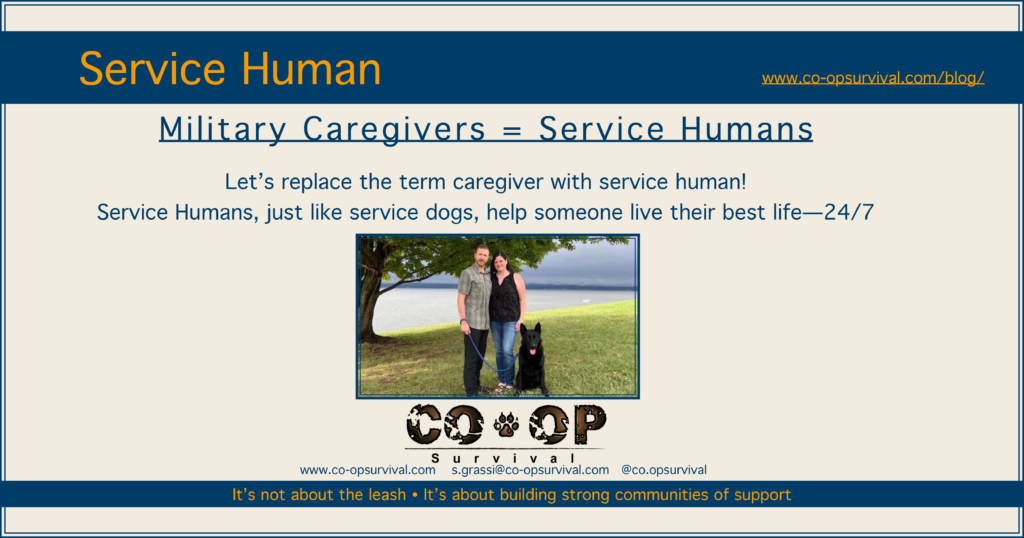
When I talk to others about military caregivers, or caregivers in general, they often confuse military caregivers with clinical caregivers.
Military caregivers, just like family caregivers, are not clinical caregivers. We are not! We are more closely related to service dogs than nurses, doctors, or social workers, but it’s almost impossible to change the visual in someone’s head when they are picturing someone in medical scrubs.
The Free Dictionary defines a clinical caregiver as a “physician, nurse, or social worker, who assists in the identification, prevention, or treatment of an illness or disability” (https://www.thefreedictionary.com/caregiver). That is not me!
Maybe if I wore a vest that said Service Human the similarity to service dogs would be a little clearer. It would give others an indication to ask, “What does your service human do for you?”. In my son’s case, he would say, “She knows my medical history, manages my medications and finances, and is my voice when life gets too complex”.
My son has a service dog named Fenris. Everyone recognizes that Fen is a service dog, not a clinical caregiver. They understand that when Fen is not in service, he’s probably chewing on a bone or lounging with our other dogs in the backyard, with one eye, always, focused on my son. Fenris has learned to provide a task for my son that replaces something he lost during his time as a soldier; I do the same. When I am not providing that task, I’d love to hang with my peers, continue my career, or go back to “normal”, but I’m not the same anymore—part of me has one eye on my son, too.
Societies function on language, that is how we share our joys, sorrows, information, history…. Words create clarity or confusion, and I’m really tired of being confused with someone who wants to work for Visiting Angels. Johns Hopkins defines a family caregiver as “a person who tends to the needs or concerns of a person with short- or long-term limitations due to illness, injury or disability”. Every person in the world fits this description at one point in their life or another, as noted by former first lady Rosalyn Carter, “There are only four kinds of people in this world: those who have been caregivers, those who are currently caregivers, those who will be caregivers and those who will need caregivers. Caregiving is universal.” (https://rosalynncarter.org/)
It’s no wonder the public does not understand what it means to commit to a person with a disability—fully… 24/7.
For those caregivers who commit to replacing a function of another person’s life, service dogs, as defined by ADA service dog policy, more closely resembles our lives: “dogs that are individually trained to do work or perform tasks for people with disabilities.” (https://www.ada.gov/resources/service-animals-2010-requirements/#how-service-animal-is-defined).
ADA service-dog policies are focused on the needs of the disabled person, not on the dog. They don’t care if the dog is a mutt or bred specifically for service. They don’t care if the dog was with the person when they were injured, how they came into their lives, who trained them, or when they might be replaced. Service dog policies ensure that an individual who is diagnosed with a disability can get the support they need, with access to that support 24/7, no matter where they go. And ADA policy tells the public how to accommodate that service dog. How many of you know how to accommodate a caregiver? If I say I’m a service human, do you have a better idea of my life and how you might be accommodating? Hmmm… maybe that’s another blog post!
Dogs don’t choose to be service dogs and neither do service humans. We become something that we didn’t choose to be, because someone we love needs us. I’ve run from an uncomfortable situation on many occasions, saying, “this is not me”, and I’ve listened to countless others share their moments of frustration. Most of us, in time, learn to step into the voids created by combat injuries, but it’s a long time before any of us feel comfortable in this role. And no matter how long I support my son, there is always that part of me saying, I’m still a technical writer, a mom, a wife… I do not wear medical scrubs and I am not a clinical caregiver! I’m a service human!
